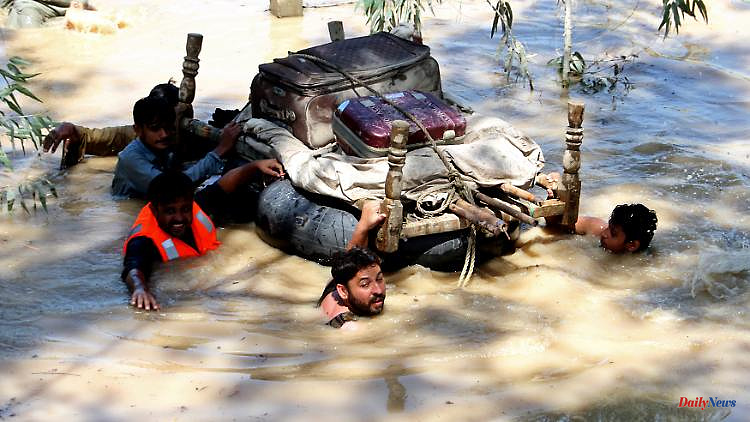After the flood disaster that killed more than 1,000 people, Pakistan's government warned the world community about the consequences of climate change. The threat is "real, powerful and staring us in the face," says Prime Minister Sharif. Above all, he hopes for help from the industrialized countries.
Prime Minister Shehbaz Sharif has again appealed to the international community in view of the devastating floods in Pakistan that have killed more than 1,000 people. "The industrialized countries in particular should not hand over developing countries like Pakistan to climate change," he wrote on Twitter.
The civil protection authority expected the number of deaths to continue to rise. Although there is currently no rain in most parts of the country, thunderstorms and rain are expected in the catchment areas of all major rivers. Although the South Asian country emits less than one percent of the world's climate-damaging CO2 emissions, Pakistan is in eighth place among the countries most exposed to the consequences of climate change, Prime Minister Sharif wrote.
"Today we are affected, tomorrow it can be someone else," he added. The current devastation caused by the flood disaster in Pakistan proves the seriousness of the situation. "We need our friends around the world to help the suffering people," Sharif wrote. "The threat of climate change is real, powerful and staring us in the face," it said.
Climate Protection Minister Sherry Rehman also attributed the flooding to the climate crisis. This year's rains are a relentless, unprecedented "monster monsoon," she wrote on Twitter. "He has obviously brought an unbridled climate dystopia to our doorstep."
In Pakistan, the annual monsoon season usually lasts from June to September. The South Asian country with around 220 million inhabitants has been hit by unusually heavy monsoon rains since mid-June. Natural disasters such as floods, droughts and landslides have increased in Pakistan in recent years. Experts blame climate change for this. According to the latest information from the national civil protection agency, more than 1,160 people have died from the floods since mid-June. 384 children were among the dead, it said. According to the government, more than 33 million people in 116 of Pakistan's 160 districts are affected.
The authority recently warned again of flooding of the Indus rivers in the most populous provinces of Punjab and Kabul in the north-west of the country. Floods destroyed houses and infrastructure, especially in the province of Balochistan in the south-west of the country. The northwest is now also struggling with major damage. According to the authorities, more than 8,000 square kilometers of agricultural land and crops have been destroyed.
More than 730,000 livestock also died from the floods, it said. Hundreds of thousands of people are currently cut off from their environment and have no access to food, clean water and medicine. The UN Population Fund estimates that nearly 650,000 pregnant women in the affected areas need medical attention.
On Tuesday, the UN and Pakistan's government presented an initial aid plan for six months worth 160 million dollars (around 160 million euros). Secretary General António Guterres called for greater efforts in the fight against the climate crisis. "Let's stop sleepwalking towards the destruction of our planet," he said in a video message. A UN spokesman said Guterres would visit the country next week.












